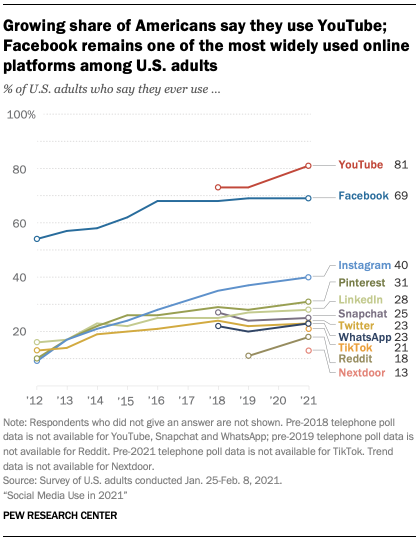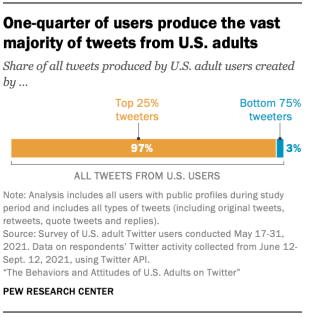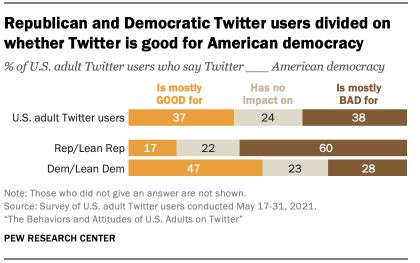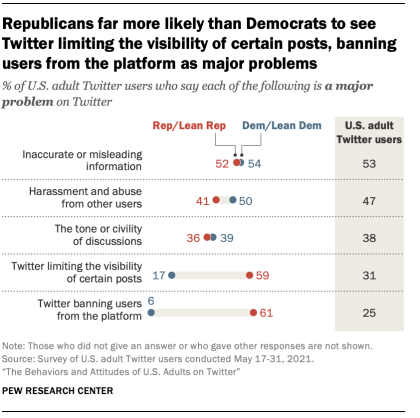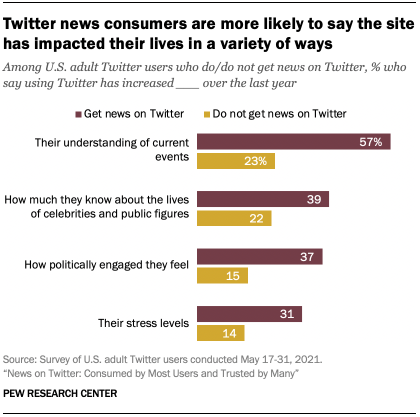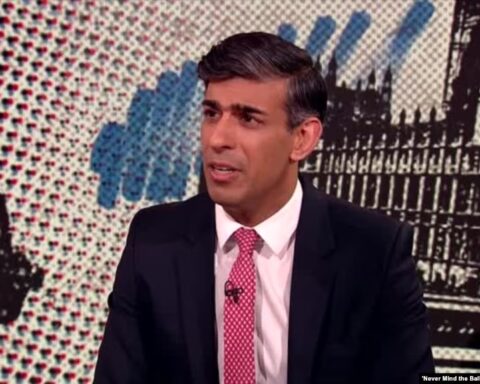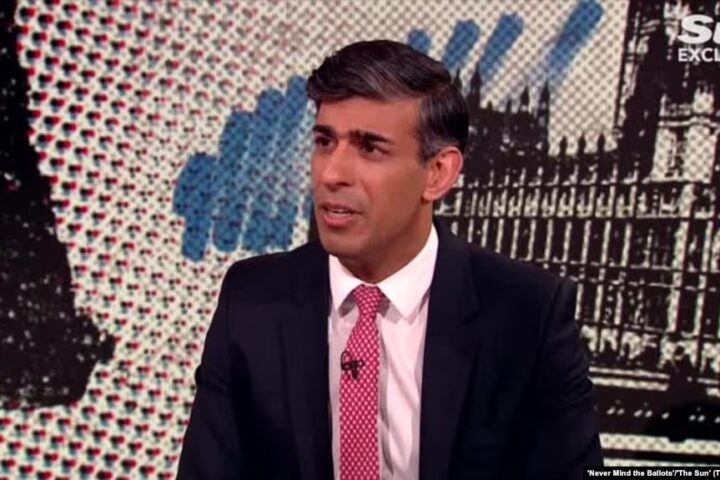Elon Musk’s $44 billion bid to acquire Twitter has focused new attention on the high-profile social media platform, which was founded in 2006. Today, millions of Americans use Twitter to break and comment on news, disseminate official pronouncements, organize campaigns and protests, or just let their friends know what’s on their minds.
Here are 10 facts about Americans and Twitter, based on recent Pew Research Center surveys and other studies.
Around one-in-five U.S. adults (23%) say they use Twitter. The share of Americans who use the platform has remained consistent over the past several years and is similar to the share who use Snapchat (25%) and WhatsApp (23%). But a much larger share of U.S. adults use YouTube (81%), Facebook (69%) and Instagram (40%).
Democrats are more likely than Republicans to use Twitter. Around a third of Democrats and Democratic-leaning independents (32%) report using Twitter, 15 percentage points more than the share of Republicans and Republican leaners who say the same (17%).
Also, U.S. adults under 30 are more likely than older Americans to use Twitter. Some 42% of adults ages 18 to 29 say they use it, compared with just 7% of those 65 and older – a difference of 35 points.
A minority of Twitter users produce the vast majority of tweets. Among U.S. adults who use Twitter, the top 25% of users by tweet volume produce 97% of all tweets, while the bottom 75% of users produce just 3%, according to an analysis conducted over a three-month period in 2021.
Infrequent and frequent tweeters tend to tweet in different ways. Replies to other users are the most common type of tweet by infrequent tweeters. They account for roughly half of their tweets (51%), compared with 30% of those sent by more frequent tweeters. By contrast, retweets of other posts make up almost half of all posts (46%) from more frequent tweeters, versus only 26% of those from less active tweeters.
Democratic and Republican Twitter users differ in their views of the platform’s impact on democracy. Almost half of Twitter users who are Democrats or who lean Democratic (47%) say Twitter is mostly good for American democracy, but only 17% of Republicans and Republican leaners say so. Republican Twitter users, in turn, are roughly twice as likely as Democratic users to say the site is bad for American democracy (60% vs. 28%).
Around one-in-five adult Twitter users in the U.S. have experienced harassing or abusive behavior on the platform, and a third say they see a lot of inaccurate or misleading information there. The majority of adult Twitter users have not experienced harassing or abusing behavior on the site, but 17% say this has happened to them personally.
Meanwhile, the vast majority of Twitter users (91%) say they come across at least some inaccurate or misleading information on the platform, and 33% say they come across a lot of this sort of content. Republican Twitter users are more likely than Democrats to say they come across a lot of inaccurate or misleading information (45% vs. 27%).
Around a fifth of U.S. adult Twitter users think nobody sees their tweets. Most users assume their tweets have a very limited audience: The majority (67%) think only a few people see their content, and 21% think nobody sees it.
Still, more than half of Twitter users (54%) consider whether the content they post publicly on Twitter could be used against them in the future before doing something that might be visible to other people on the site. And comparable shares consider who can see these things (53%) or whether that activity portrays them in a positive light to others (49%).
For some users, these concerns are not just hypothetical. About one-in-five Twitter users (21%) say they have posted something on the site that they later regretted sharing.
Republican Twitter users are far more likely than Democrats to say it’s a major problem that Twitter limits the visibility of certain posts or bans users from the platform. Overall, 31% of U.S. users say Twitter limiting the visibility of certain posts is a major problem, and 25% say the same about banning users from the platform. However, Republican Twitter users are roughly 10 times as likely as Democrats to say banning users from the platform is a major problem (61% vs. 6%), and more than three times as likely to say user bans are a major problem (59% vs. 17%). One of the most high-profile people to be banned from the platform is former President Donald Trump.
When it comes to other perceived problems, around half of Twitter users say the presence of inaccurate or misleading information (53%) and harassment and abuse from other users (47%) are major problems, while 38% say the same about the tone or civility of the discussions there. Partisan views are similar when it comes to how large a problem inaccurate information and the tone or civility of discussions are.
Most Twitter news consumers in the U.S. say using the platform has increased their understanding of current events in the last year, but around a third say it has increased their stress levels. Overall, around seven-in-ten adult Twitter users in the U.S. (69%) get news on the site. A 57% majority of those who get news on Twitter say using the platform has increased their understanding of current events, compared with 23% of other Twitter users.
Twitter news consumers also are more likely than other Twitter users to say using the site has increased how much they know about the lives of celebrities and public figures (39% vs. 22%) and how politically engaged they feel (37% vs. 15%). However, Twitter news consumers are also more likely to report that it has increased their stress levels: 31% of Twitter news consumers say this, compared with 14% of other Twitter users.
Many Twitter account holders are unclear about their privacy settings. Among Twitter users who provided their handles to the Center and say their account is private or are not sure of their settings, 83% actually have a public profile.



